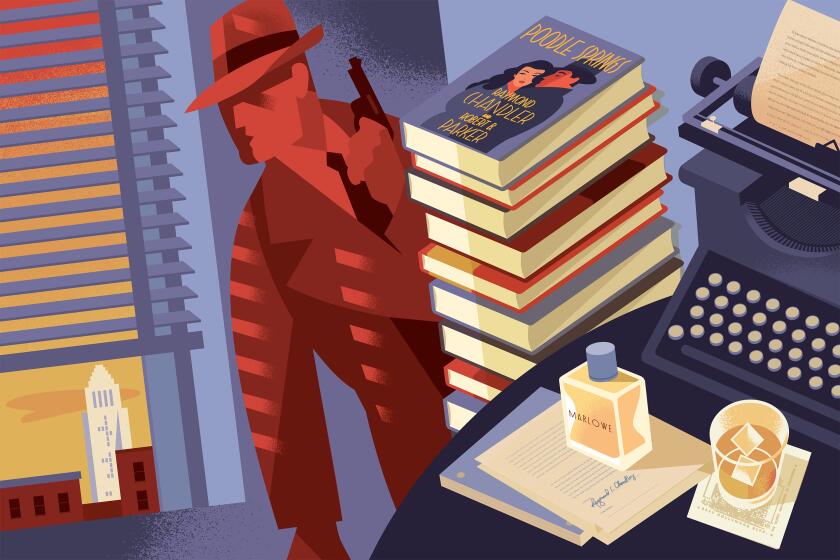The Literary Seductions of a Macho Woman : DALVA <i> by Jim Harrison (E. P. Dutton/ Seymour Lawrence: $18.95; 324 pp.)</i>
Dalva has kept a light burning in her heart for a dead husband of less than a day; for her father lost in Korea, and most of all, it seems, for the Sioux nation driven out of their rich Nebraska grasslands a century ago. She comes from a family strangely at home among the dead. She’s inherited a farmhouse from a beloved grandfather that is more than adjacent to a gardenlike cemetery full of ancestors; in the house itself, death maintains a terrifying, literal presence.
Jim Harrison’s new novel, “Dalva,” is not a story of the supernatural, but it is a tale about ghosts, haunting, about the continuing presence of those departed from this world. It is also the story of a remarkably modern woman’s search for her son relinquished at his birth. At the same time, it is the saga of a fascinating, eccentric pioneer befriended by the beleaguered native peoples of the Plains at the time that their world is closing in on them.
I’ve never read another Harrison novel, but I’ve spoken with several men--writer John Nichols among them--who are passionate fans of his work. His books that are repeatedly recommended are “Legends of the Fall” and “A Good Day to Die.” No woman I know has expressed an interest in Harrison. So “Dalva” may be an important departure for this Michigan writer so associated with the outdoors, with what might be termed “macho,” since the central figure here is a woman. He could win a whole new readership. He certainly deserves it.
Harrison is not a very neat, linear storyteller. Like a photographer, he’s interested in the angles. He works in vignettes, in half-formed, half-finished episodes. (Reading Harrison is a little bit like eavesdropping on a couple of people engaged in a conversation in an elevator who step out at the very point where their exchange becomes gossipy--the doors close and those of us left inside never get to hear who did what to whom.) Dalva has a sister, for instance, Ruth, a wealthy divorcee in her 40s who is messing around with a priest that she’s trying to get to impregnate her. What we are allowed to listen in on is lurid and humorous, but we are cut off, finally, with no sense of what actually drives Ruth to such extreme behavior.
Harrison gives us fleeting, fragmented portraits. Even his main characters slip in and out of focus as frequently as they make entrances and exits. Some of his most colorful, vivid characters make the briefest of appearances: the restless Uncle Paul (with his multigenerational seraglio of Mexican mistresses)--a wonderful naturalist and writer. We are privy to a sample of his writing in one instance, and then never read another written word of Paul’s innermost thoughts; a taciturn, gentle cowboy selling puppies who becomes a lover of Dalva’s, then sort of drifts off; an elderly Sioux woman, Rachel, whose greatest treat is a short road trip and whose candy-pink, dime-store scarf signifies for Dalva the extreme poverty the Sioux have been reduced to.
Duane Stone Horse, Dalva’s lover-husband, is the central romantic figure here. His presence is felt by the very fact of his absence. Duane’s spirit hovers everywhere over the story, guiding Dalva like a guardian angel. He’s leading her home.
The poetic love story between Dalva and Duane is only one-third of the three points of view that Harrison exercises here. Dalva narrates parts one and three. Part two comes to us via professor Michael--more about him later. The third story line comes to us through journal entries about the frontier adventures of Dalva’s amazing ancestor, Northridge.
At 45, Dalva’s been married once--for less than a whole day--(a strange and tragic sequence) but has essentially remained a single woman who has been on the move most of her life. She grows up the daughter of a well-to-do, Nebraska farming family of mixed Anglo and Sioux blood. The name Dalva is derived from a Brazilian samba: “Estrella Dalva,” Portuguese for morning as in Morning Star. Morning, of course, also brings to mind “mourning.”
Dalva wanders through the Southwest; travels abroad; drifts to New York, where she lands a job with a sleazy documentary film maker; she winds up employed as a social worker in Santa Monica, which is where we find her when the novel opens.
There’s something profoundly troubling about the ocean for Dalva. It remains a great, unfathomable thing in her life, associated with mystery and loss. The coasts represent a physical and psychic edge to her. How she has lived her life in New York, or Los Angeles, reflects this--nothing seems wholesome or particularly healthy in either environment. Earth is her anchor. After Dalva undergoes a personal tragedy involving the ocean in Florida, her Uncle Paul brings her back to the Baja coast, as much desert as it is seashore, where she psychically heals. Later, when she departs Los Angeles to return to Nebraska, Dalva camps in the Arizona desert alone; she strips naked in front of the fire and meditates in what might approximate a Native American ritual of purification, a homecoming of sorts.
Water also signifies baptism and it is the baptism of the adolescent Dalva that literally plunges her into a passionate union with Duane, a wild, moody, half-Sioux boy her grandfather mysteriously brings to the farm.
Dalva’s reunion with Duane in Florida many years later contains some of the finest writing in the book--intense, dreamlike, nightmarish. It vibrates with a psychedeliclike intensity, so surreal and eerie a sequence of events it is.
Along with contemporary events, the history of Dalva’s family in Nebraska unfolds in vivid, sometimes shocking and always moving journal entrees made by the pioneer Northridge, the great-grandfather of Dalva. He comes West driven by the desire to convert the Indians to Christianity (a longing that dissolves with his increased familiarity with the native tribes) and to plant trees. Word passes tribe to tribe about this nutty, lone, white man who goes around planting things, talking to trees, talking to the elements. The Indians hear that the whites themselves think Northridge is a little crazy. At one of his first encounters with the Sioux, he is told: “ ‘You are too strange to kill.’ ” He fraternizes with warriors whose names Dalva loves to roll off her tongue, names that haunt the entire narrative: Joe White Coyote, Daniel Blue Horse, Kills a Hundred, He Dog, Crazy Horse. Eventually Northridge converts to the ways of the Sioux, even as they are hunted, massacred and cornered.
The Northridge journals hold the key to tenure for history professor Michael, who shares certain qualities with other Harrison characters I’ve been told about. He has a passion for fine food and a predilection for excessive drinking. He is both intelligently introspective and at the same time cynical about his chosen line of work, about how he has lived his whole life. One gets a handle on him more so than on any other character in the book. Michael--with all his foibles and frustrating ways--is presented with unflinching clarity.
Michael’s research permits him to become a house guest at Dalva’s Nebraska homestead, a situation that leads to sometimes sadly comical misadventures. While Dalva is at home on horseback, out in nature, among farm animals, urbanite Michael couldn’t be more out of his element. His first hike ends up a disaster: He gets lost and wakes up from a nap surrounded by snakes.
Michael and Dalva have made a pact: She’ll let him be the first outsider to have access to a protected, personal history, and he will help her locate her son. They have been occasional lovers, but Michael knows he will never possess this intimidating, self-possessed woman of means.
Harrison beautifully conveys Dalva’s essential femininity despite his character’s qualities that are undeniably androgynous, perhaps even masculine: a comfort in the outdoors, a reticent and independent nature, even her sad and undeniable promiscuity. Dalva asserts that she has never been seduced--has always, subtly, done the seducing of lovers herself.
A novel of considerable ambiguity and hard-edged compassion, Harrison’s “Dalva” may well seduce you too.
More to Read
Sign up for our Book Club newsletter
Get the latest news, events and more from the Los Angeles Times Book Club, and help us get L.A. reading and talking.
You may occasionally receive promotional content from the Los Angeles Times.






